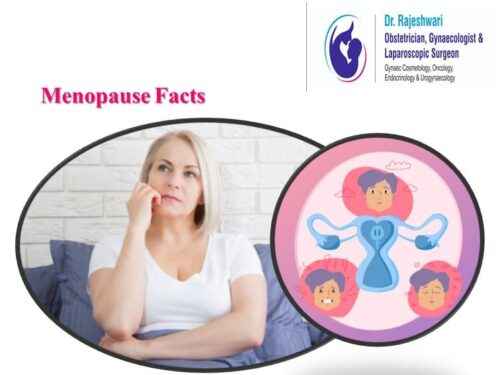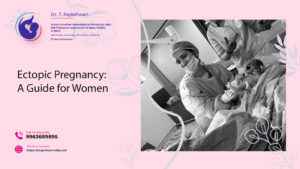Menopause is a natural biological process that every woman undergoes in her life. It marks the end of her periods. It is diagnosed when a woman doesn’t have menstrual periods for up to 12 months. A woman can reach menopause in her 40s or 50s or maybe earlier than the anticipated age – after age 35 as well. The average age of menopause in India is around 50 years. This natural process comes with some disturbing symptoms such as low energy levels, sleep disturbances, emotional disturbance, hot flushes and mood swings– which affect the emotional and physical health of women.
How to know whether you are in the initial stages of menopause is a bit tricky because signs and symptoms vary among women, but mostly there is some sort of disturbance and irregularities in the periods before they finally come to an end. Let us see how these menstrual irregularities differ.
Menstrual Irregularity is the first signal…
Women approaching menopause are more likely to experience some sort of irregularities in their periods before they come to an end completely. During perimenopause phase skipping periods is common and expected. After skipping periods for some time – for instance, a month or so – periods return back; and sometimes, women miss periods for several months altogether and then their monthly cycles resume for another few months. In some cases, periods seem to be of shorter cycles, lighter or heavier. Any of these period trends may be possible. Irregularities in periods before they end seem to be common and expected during a perimenopausal phase.
This phase may continue for several months to years.
Menopause symptoms
The following are the typical early signs of perimenopause – less frequent menstruation, night sweats, hot flushes, lighter or heavier periods.
Let us see what type of symptoms are associated with menopause apart from menstrual irregularities. The following are some of the typical signs and symptoms of menopause.
- Hot flushes
- Night sweats
- Mood changes
- Changes in sleeping habits
- Vaginal dryness
- Slow metabolism
- Weight gain
- Dry skin & Thinning hair
- Loss of breast fullness
- Breast soreness
- Anxiety, memory problems & Depression
- Reduces libido or sex drive
- Sexual dysfunction
- Increased urination
- Reduced bone mass
- Reduced muscle mass
Premature Menopause – Is It Possible?
Yes, it is possible, but in very few women. Premature menopause occurs in nearly about 1 to 2% of women before they reach 40 years. Experts attribute this type of menopause to the failure of their ovaries to produce adequate levels of reproductive hormones (primary ovarian insufficiency), which can be due to either an autoimmune disorder or genetic factors. Women who experience menopausal symptoms early should see their gynaecologist immediately as they are more likely to have future complications – such as heart disease and osteoporosis. Hormonal therapy is beneficial for women who have reached menopause early as it helps in preventing future complications and protects their heart and bones.
Which factors determine that a woman will begin menopause?
The overall reproductive health and her typical genetic makeup determine when a woman will begin menopause. A woman approaching menopause experiences hormonal changes that prepare her for menopause. The premenopausal phase during a woman’s reproductive life can last anywhere from a few months to several years.
In very few women perimenopause begins before age 40. But in the majority, it begins after age 40.
Are there any other factors that could lead to menopause? Yes, Oophorectomy is one such factor.
Ovaries produce estrogen and progesterone hormones that regulate the menstrual cycle. Surgical removal of ovaries (oophorectomy) causes immediate menopause. Menopausal symptoms such as cessation of periods, hot flushes, mood changes manifest after this procedure. In Hysterectomized (uterus removal surgery) individuals though they don’t have periods her ovaries release eggs and produce progesterone and Estrogen hormones and hence there are no menopausal symptoms prior.
Increased risk of some health conditions after Menopause
In addition to the unpleasant symptoms during the initial stages of menopause, there is an increased risk of certain health issues after menopause. For instance, heart disease risk increases due to declining Estrogen hormone. Similarly, the risk of osteoporosis increases – wherein bone density progressively decreases. Hormonal therapy, vitamin D and calcium supplements seem to offer protection against the conditions associated with menopause.
Treatment
Though menopause is not a medical condition, women approaching menopause and women who have reached it should consult a gynaecologist for the best medical advice and proper management of symptoms. The expert gynaecologist will guide, counsel and provide apt treatment according to the individual needs of a woman.
Hormone therapy
The main aim of this therapy is to help balance hormone levels. Doctors prescribe supplemental Estrogen and progesterone – which comes in several forms – such as topical creams, tablets and skin patches. These are helpful in reducing nagging symptoms such as hot flushes. Your gynaecologist will decide whether you may require this type of therapy as it is not recommended for women who have other risk factors and personal history of breast cancer, stroke, gallbladder disease, blood clots and heart disease. It is always better to discuss the potential side effects and risk associated with hormonal therapy with your doctor prior to beginning it.
Other treatments
To help relieve your other symptoms, your gynaecologist may prescribe over the counter gels and other products for vaginal dryness and low-dose anti-depressants for mood changes, irritability, anxiety, depression and hot flushes.
The Best Way to Deal with Menopause is Lifestyle Changes
- Keep yourself physically active throughout the day
- Seek medical help for the management of mood and depressive symptoms
- Perform breathing and relaxation exercises
- Eat healthy foods – including plenty of fruits, vegetables, soya beans and whole grains, foods rich in calcium and Vitamin D
- Ensure healthy sleeping habits & sleep hygiene
- Quit smoking and avoid smokers
- Limit alcohol intake
- Do Kegels exercise to strengthen the pelvic floor
- Keep an active sex life
- Socialize
- Take up a new hobby, join a social group or club or volunteer
Bottom Line
Menopause is not a disease but a natural process. Though it is natural, it can potentially lead to several disorders including heart, brain and bone diseases. Especially post-menopausal women are more vulnerable to breast cancer, heart disease, osteoporosis and depression. Ensure that you will seek medical help to reduce the risk of future health issues.
Menopausal symptoms are manageable, yet a majority of women find it difficult owing to several reasons including the most prominent psychological and emotional aspects. Whatever may be the reason for your concerns pertaining to menopause, seeking a consultation with a specialist doctor can work wonders for you.




